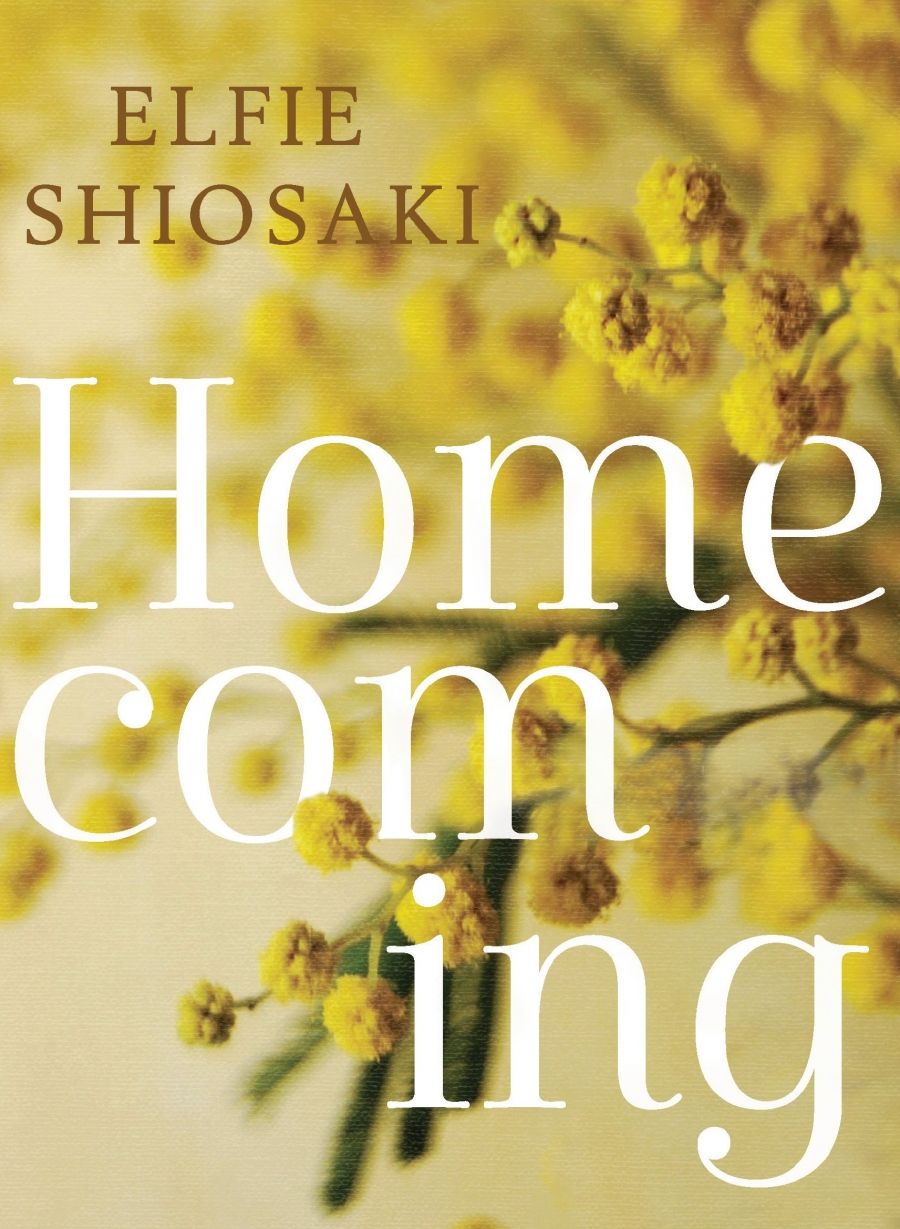
- Free Article: No
- Contents Category: Poetry
- Review Article: Yes
- Article Title: ‘Fragments of many stars’
- Article Subtitle: Elfie Shiosaki’s stellar collection
- Online Only: No
- Custom Highlight Text:
Noongar and Yawuru poet and academic Elfie Shiosaki writes in the introduction to her new poetry collection, Homecoming, that it is the story of four generations of Noongar women of which she is the sixth. The poems are ‘fragments of many stars’ in her ‘grandmothers’ constellations’. Shiosaki ‘tracks her grandmothers’ stars’ to find her ‘bidi home’. The introduction reads as a beautifully crafted prose poem that contextualises the works that follow.
- Featured Image (400px * 250px):

- Alt Tag (Featured Image): Homecoming
- Book 1 Title: Homecoming
- Book 1 Biblio: Magabala Books, $24.99 pb, 143 pp
- Book 1 Readings Link: booktopia.kh4ffx.net/BXK95W
Homecoming is woven from archival records, family letters, artworks, oral histories told by the poet’s grandmothers, and Shiosaki’s imagination grounded in her living katijin of the women before her. The work is braided into three sections – Resist, Survive, and Renew. Each section works in tandem with the others to collapse linear colonial time in a seamless weave of past, present, and future interconnected and unresolved, much like the reality of Aboriginal life. The central thread that connects the four generations of women is resilience. Shiosaki writes,
I hold on to this sadness
to tell your story
if I let go
I lose you
my sky full of stars
The poet’s archive is full of sadness as the descendants of those like Shiosaki and many other Aboriginal women come into its presence to confront, recontextualise, and set free the incarcerated stories of loved ones from the epistemic violence of legal fictions held in state-controlled archives. But coming back to the archive, as Narungga poet Natalie Harkin notes, is part of the restorative work First Nations women’s writing enacts in the truth-telling process that is needed to heal this nation.
The first part opens with a poem called ‘Story Tree’. Vibrations travel from ‘heel to heart’ to ‘trace remnant of veins, skin / imprint of your bones / into my hands’. The tree, with its ‘precious debris’ and ‘trunk and branches cry out’, is evocative of the communion between the generations of women whose stories Shiosaki reclaims in the language of Noongar boodja.
Spaces are an integral feature of Shiosaki’s poetry. Spaces create clear, distinguishable gaps and interruptions in the same way First Nations peoples were policed under state protection acts and assimilation policies. In a series of four- and five-movement poems, all linked through the motif of blood – ‘Blood Dreaming’, ‘Blood Instinct’, and ‘Blood Love’ – the spaces scream as loud and as long as the words.
‘Blood Love’ traces the institutionalisation and separation of a child stolen by the state. The third movement sees Koorlang locked in a ‘boob’ for defending herself against a nurse. Pressing herself against the ‘sandy floor’, she searches for the ‘southerly’s draft’ of home, ‘holding the darkness in’ to dream herself back to her mother. There is no fourth section – the poem skips a movement like my heart skips a beat as the will and determination of a child permeate the space. The fifth movement opens with the child conjuring strength through dreams to remember when: ‘Her sky was full of stars. / When the warmth of Ngangk’s body next to hers drew all the chill out of the world.’
‘Blood Love’ tells of the poet’s great-grandmother birthing her grandmother on the verandah of Hillcrest Maternity Hospital, Walyalup. Fleeing hours after the birth, ‘child hidden under her coat’, to board a ‘tramline that traced the Indian Ocean coastline’ to meet Koorlang’s father, Ngangk ‘imagines a new world for her first child’: ‘In this world, / children would know who they were and where they came from.’ My hopes are lifted like Ngangk’s heart through Shiosaki’s words. The third movement consists of a single line: ‘Koorlang’s father never turned up.’
These seemingly blank spaces are where the spectral/spirit world carries on and the ancestors continue their lives in pauses, in margins, and in between lines. It’s the unwritten words – what English cannot do or say – and what the page cannot contain that make the poems so powerful. Fragmented and untold stories are conjured by blank spaces. Meaning and story live on beyond the poems.
Shiosaki has described Homecoming as the culmination of five years’ research and engagement with state archives to wrest the stories of ancestors away from the coloniser’s deficit discourses and defeatism, and to reinterpret them as narratives of determination and resistance, of women navigating protectionism and assimilation to hold their families together. By restoring agency to her grandmothers, Shiosaki reclaims the power and control the state once held over their lives. The archive is recast as a place that holds the conversations and knowledges of matriarch-ancestors who still live and breathe through the past like a ‘second heartbeat’, despite the oppressive efforts of the state to silence and destroy them.
The inclusion of marginalia is central in Shiosaki’s poetic storytelling. Footnotes acknowledge the names of ancestors such as Olive Harris and Helen Shiosaki’s recorded storytelling, and Edward Harris’s many letters to A.O. Neville, Chief Protector of Aborigines. In a retracted letter of 1918 (reproduced in the book), Harris ‘orders’ Neville to return his children, stating that he ‘has done what you thought was necessary’ and ‘the conditions under which they be living would be the same in any working man’s home’.
This collection shines with fragments of stars gathered by Shiosaki to honour her grandmothers. Women’s voices amplify above and beyond the archive prison to resist, survive, and renew. ‘The archive could never hold the beauty of a daring Noongar woman.’
Homecoming is a stellar constellation.


Comments powered by CComment